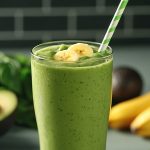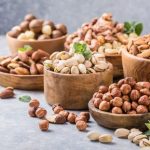I eat a lot of fruits and vegetables to support my heart health.
In fact, one of my favorite kinds of green smoothies is filled to the brim with fruits and vegetables. I start with some honey and nut milk followed by a generous bunch of dark-leafy green vegetables like spinach or romaine.
Then, I’ll add in some blueberries or a frozen banana and top it off with a heaping teaspoonful of ground flaxseed and some organic almond or cashew butter. Then, I’ll blend it until it’s smooth and creamy.
This delicious meal doesn’t just satisfy my craving for something sweet. It also goes a long way in providing my body with enough fruits and vegetables for the day.
I share this story because reports estimate that one in every seven cardiovascular deaths can be blamed on low fruit intake. Yikes! Another one in 12 cardiovascular deaths can be blamed on not eating enough vegetables.
Yes, fruits and vegetables really do have that much of an impact on your heart health.
I believe these stats. In fact, I’d even wager they are understated.
After all, only one out of every 10 adults eat the recommended daily servings of fruits and vegetables. This means 90% of adults are eating less than the current guidelines of 1½ to 2 cups of fruit per day and 2 to 3 cups of vegetables.
So, stop right now and take a good hard look at your diet. Are you eating a wide variety of organic fruits of vegetables – and a lot of them – every single day?
And I’m not talking about an apple with an iceberg salad heaped with dressing. Instead, consider the wide array of fruits and vegetables in all the colors of the rainbow.
Check out the berries, melons, citrus fruits, plums, pears and avocadoes. Think of those leafy greens (spinach, kale, cabbage, etc.), carrots, cucumbers, broccoli, asparagus, squash, cauliflower, peppers, celery, mushrooms or squash. Keep them organic and keep them crunchy, so as not to cook out the nutrients you need.
Regular and abundant amounts of these foods will do your body a world of good. It’s the number one way you can help your heart health.
Now that we’ve gotten that out of the way, let’s talk about four lesser-known ways you can help keep your heart healthy.
Watch Out for Gum Disease and Constipation
Watch out for gum disease! As it turns out, all of those nasty, gum-destroying bacteria (P. gingivalis and others) don’t just stay in your mouth. They also escape into your bloodstream. Once there, they are bad news for your circulatory health.
These bacteria damage the walls of your blood vessels, contribute to the buildup of arterial plaque and can even cause blood clots.
Brush, floss, rinse and keep up with our regular dental checkups. If you tend to run into gum issues, try supplementing with 200 mg of CoQ10 daily.
I also recommend taking an oral probiotic regularly. They are similar to a mint and you just roll them around in your mouth until they dissolve.
And then there is constipation. Believe it or not, constipation takes a toll on your cardiovascular system. If you evacuate your bowels less than once every day, it could be affecting your cardiovascular health. In particular, having a bowel movement only once every two or three days increases your risk of cardiovascular death by about 21%. Going only once every four days kicks that risk up to 39%.
Not only that, but straining to go can cause an abrupt increase in blood pressure that increases your risk of suffering a stroke shortly afterward. Thus, it’s important not to strain while on the toilet.
Eating plenty fruits and vegetables, drinking enough water and getting your daily exercise are the three best ways to ensure regular, healthy bowel movements.
Additionally, I often suggest that my patients invest in a “Squatty Potty”. It allows you to squat over the toilet bowl, which helps straighten out your colon and reduce strain while you empty your bowels.
Take Care of Your Emotions and Get Some Sunshine
I have several patients who are going through hard times in the emotional sense. They are depressed, dissatisfied or dealing with feelings of anger and aggression. And it’s no coincidence they are also dealing with heart problems.
When these types of emotions drive you, it puts your entire body into overdrive. Your blood pressure rises, stress takes a toll, your immune response gets compromised and inflammation sets in.
Two of the most harmful inflammatory markers associated with negative emotions are inflammatory C-reactive protein (CRP) and (IL-6). Both of these compounds are linked to a higher risk of heart attack and stroke. And they increase dramatically when you are stressed out.
Just as importantly, your risk of a heart attack rises by about five times in the two hours after an angry outburst. And your chance of a stroke is more than three-fold during that same time period. The more often you have these outbursts, the higher the risk.
So when you start feeling overwhelmed or have hostile thoughts, work on pushing them away. Try deep breathing exercises and meditation techniques to re-gain mental clarity.
I also suggest trying a local yoga class. This practice encourages a strong mind-body connection. It can be very effective in developing a peaceful state of mind.
And by the way… there is nothing wrong with visiting a certified mental health professional if you are having a hard time overcoming these feelings on your own. They can help.
I also want to talk about getting out in the sun. While you’ve always been taught to shield yourself from the sun, avoiding it completely can deplete your stores of vitamin D. This is very bad news for your heart health.
Compared to people with the highest levels of vitamin D, those with the lowest are shown to have…
- 40% higher risk of ischemic heart disease
- 64% higher risk of heart attack
- 57% higher risk of early death
- No less than an 81% higher risk of death from heart disease
- Plus, when your skin is exposed to sunlight, it increases the levels of nitric oxide (NO) in your skin and blood. NO is absolutely crucial to ensure blood flow to your heart, brain and other organs.
Plus, vitamin D might help with some of those emotional issues we just talked about. That’s because an insufficiency of the sunshine vitamin is associated with increased anger, anxiety, depression and poor-quality sleep.
So try to get a little sunshine every day – without sunscreen. Your best bet is a walk early in the morning when the sun is still low in the sky. I also recommend taking a vitamin D supplement in the form of cholecalciferol, especially if you live north of Atlanta or have been tested as deficient.
SOURCES:
Millions of cardiovascular deaths attributed to not eating enough fruits and vegetables. News Release. American Society for Nutrition. June 2019.
Only 1 in 10 Adults Get Enough Fruits or Vegetables. News Release. Centers for Disease Control and Prevention. Nov 2017.
Sanz M, et al. Periodontitis and cardiovascular diseases: Consensus report. J Clin Periodontol. 2020 Mar;47(3):268-288.
Ishiyama Y, et al. Constipation-induced pressor effects as triggers for cardiovascular events. J Clin Hypertens (Greenwich). 2019 Mar;21(3):421-425.
Ma W, et al. Associations of Bowel Movement Frequency with Risk of Cardiovascular Disease and Mortality among US Women. Sci Rep. 2016; 6: 33005.
Suarez EC. C-reactive protein is associated with psychological risk factors of cardiovascular disease in apparently healthy adults. Psychosom Med. 2004 Sep-Oct;66(5):684-91.
Suarez EC. Joint effect of hostility and severity of depressive symptoms on plasma interleukin-6 concentration. Psychosom Med. 2003 Jul-Aug;65(4):523-7.
Mostofsky E, et al. Relation of outbursts of anger and risk of acute myocardial infarction. Am J Cardiol. 2013 Aug 1;112(3):343-8.
Brøndum-Jacobsen P, et al. 25-hydroxyvitamin d levels and risk of ischemic heart disease, myocardial infarction, and early death: population-based study and meta-analyses of 18 and 17 studies. Arterioscler Thromb Vasc Biol. 2012 Nov;32(11):2794-802.
“Here comes the sun to lower your blood pressure.” Univ of Southampton. News Release, Jan 2014.




